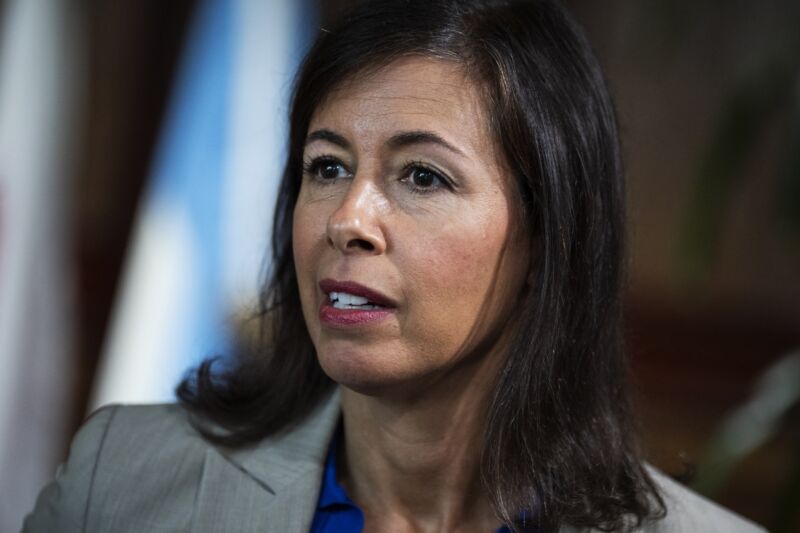
Getty Images | Tom Williams
The Federal Communications Commission is about to start winding down a program that gives $30 monthly broadband discounts to people with low incomes, and says it will have to complete the shutdown by May if Congress doesn’t provide more funding.
The 2-year-old Affordable Connectivity Program (ACP) was created by Congress, and Democrats have been pushing for more funding to keep it going. But Republican members of Congress blasted the ACP last month, accusing the FCC of being “wasteful.”
In a letter, GOP lawmakers complained that most of the households receiving the subsidy already had broadband service before the program existed. They threatened to withhold funding and criticized what they called the “Biden administration’s reckless spending spree.” The letter was sent by the highest-ranking Republicans on committees with oversight responsibility over the ACP, namely Sen. John Thune (R-SD), Sen. Ted Cruz (R-Texas), Rep. Cathy McMorris Rodgers (R-Wash.), and Rep. Bob Latta (R-Ohio).
With no resolution in sight, the FCC announced that it would have to start sending out notices about the program’s expected demise. “With less than four months before the projected program end date and without any immediate additional funding, this week the Commission expects to begin taking steps to start winding down the program to give households, providers, and other stakeholders sufficient time to prepare,” the FCC said in an announcement yesterday.
The Biden administration has requested $6 billion to fund the program through December 2024. As of now, the FCC said it “expects funding to last through April 2024, running out completely in May.”
FCC to stop enrolling new households
FCC Chairwoman Jessica Rosenworcel has repeatedly asked Congress for more ACP funding, and sent a letter to lawmakers yesterday in which she repeated her plea. The chairwoman’s letter said that 23 million households are enrolled in the discount program.
“If Congress does not provide additional funding for the ACP in the near future, millions of households will lose the ACP benefit that they use to afford Internet service,” Rosenworcel wrote. “This also means that roughly 1,700 Internet service providers will be affected by the termination of the ACP and may cut off service to households no longer supported by the program.”
Since no funding has been added, Rosenworcel said the FCC will soon have to “announce a date for stopping the enrollment of new households in the ACP.”
“While this step will preclude additional households from benefiting from this important program, it is necessary to slow the depletion of the remaining funding and reduce volatility in the program. This step will also stabilize the number of households affected by the end of the ACP and reduce consumer confusion,” Rosenworcel wrote.
The FCC will give ISPs “guidance on the timing and requirements for notifying participating households about the projected end of the ACP,” she wrote. “To avoid consumer confusion and minimize the risk of consumer bill shock, providers must give consumers specific, frequent notice about the projected end of the program and their ACP discount, and how that will impact their Internet bill.”
Rosenworcel warned that the impending ACP shutoff “would undermine the historic $42.5 billion Broadband Equity, Access, and Deployment Program,” a different program created by Congress to subsidize ISPs’ expansion of broadband networks throughout the US. The discount and deployment programs complement each other because “the ACP supports a stable customer base to help incentivize deployment in rural areas,” Rosenworcel wrote.
GOP support needed to keep program alive
GOP support is needed to keep the program alive, given the Republican majority in the House of Representatives. Rosenworcel defended the program at a recent House hearing, and her testimony was criticized by Republicans who disputed her statement that households would be “unplugged” from the Internet without continued discounts.
“While you have repeatedly claimed that the ACP is necessary for connecting participating households to the Internet, it appears the vast majority of tax dollars have gone to households that already had broadband prior to the subsidy,” the Republicans’ December 2023 letter to Rosenworcel said.
That may be partly explained by the fact that many ACP recipients were getting a different discount under a predecessor program that ended once the ACP was implemented. The $30 monthly ACP benefit replaced the previous $50 monthly subsidy from the Emergency Broadband Benefit Program that started enrolling users in May 2021.
A household is eligible for the ACP if its income is at or below 200 percent of federal poverty guidelines or if it participates in other federal assistance programs such as Medicaid or the Free and Reduced-Price School Lunch Program. Losing the $30 monthly discount could force families to choose between broadband and other necessities, the White House said when it asked Congress for more ACP funding.

